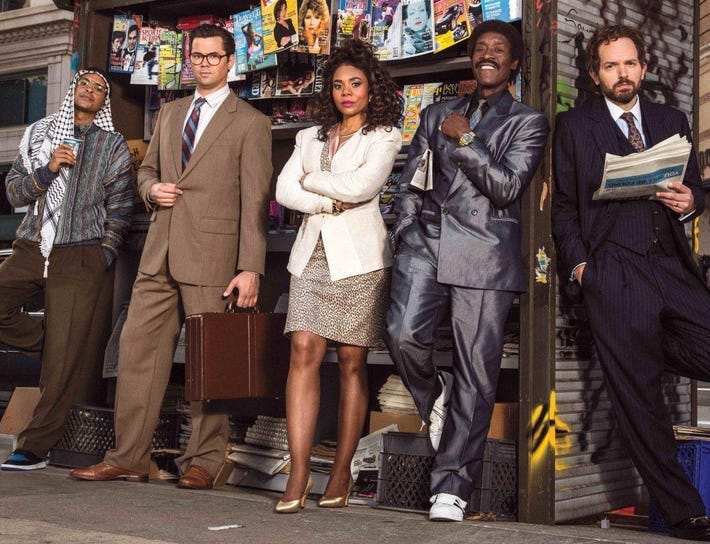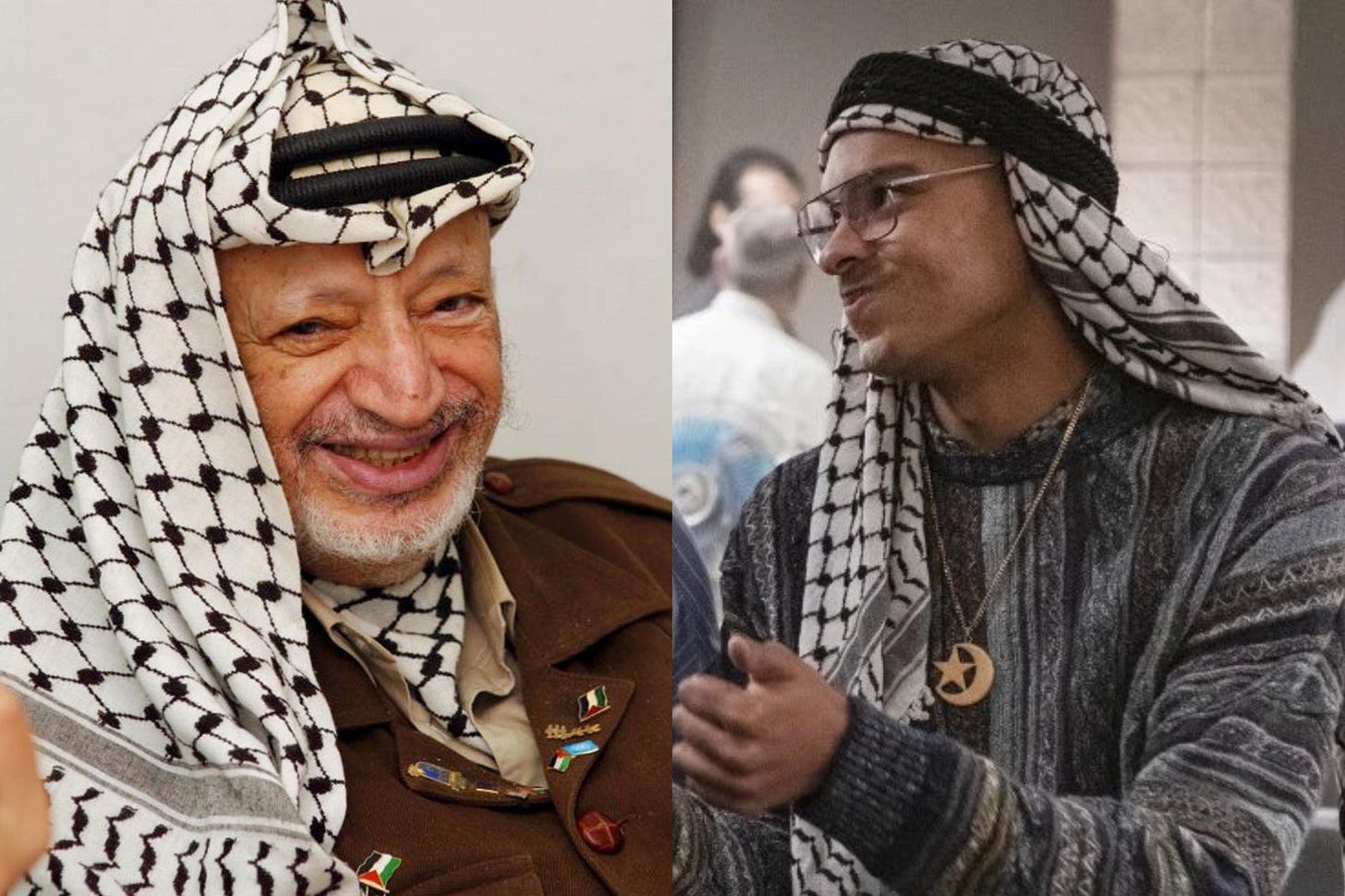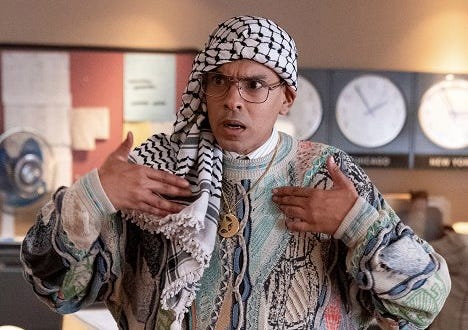Yassir X, the unsung hero of Black Monday
on the importance of Yassir Lester's character and his embodiment of Black and Palestinian culture
On January 20th, 2019, Black Monday, a dark comedy created by Jordan Cahan and David Caspe, premiered on Showtime, starring Don Cheadle, Regina Hall, Paul Scheer and Andrew Rannells as its main cast. The series would run for three seasons, telling a fictional story of the lead-up and aftermath to Black Monday, the infamous stock market crash that occurred on October 19th, 1987.
During a table read before the pilot of the show had started filming, comedian and writer Yassir Lester was asked to read the small part of an Indian character; the read went so well that he was then asked if he could play the character. Lester pointed out that as he is Black and his dad was Palestinian, he couldn’t play an Indian character; he instead proposed to lean into his Palestinian side, as there were already a few full Black characters on the show—most notably Cheadle’s Mo Monroe and Hall’s Dawn Darcy.
Lester’s character became Yassir X, a trader for Mo’s Wall Street firm the Jammer Group. While Lester’s is a recurring role and therefore doesn’t get the in-depth treatment the main characters’ story and development does, he still manages to steal the show every time he appears on screen, a testament to Lester’s charisma and impeccable delivery, and he’s definitely not an unimportant or meaningless character—not remotely.
One of Black Monday’s peculiarities is the way in which it never shies away from the rough and truthful portrayal of social and political issues: through the medium of comedy alongside skillful writing and acting, just about every issue is tackled—from racism, to sexism, to homophobia, to gender-racism, to class-racism, and everything in between.
Although Yassir X does mostly watch from the sidelines as the four main characters wreak havoc that he often gets mixed up in, his character is in many ways one of the brightest examples of the show’s transparency and boldness when it comes to these issues that most mainstream media tip-toes around- and, perhaps more importantly, of Yassir Lester’s own boldness and pride in his identity and beliefs, which seep into and elevate all of his work.

Yassir X usually wears a COOGI sweater: COOGI is an Australian brand known for its intricate and colorful designs, which rose to popularity among the Black community in the 80s, when Bill Cosby wore similar sweaters on his show, and gained even more traction and positive connotations in the 90s, when The Notorious B.I.G. began wearing it and name-dropping it in multiple songs.
Yassir X always wears a crescent moon and star necklace, a symbol that rose to popularity during the Ottoman Empire’s rule and became widely recognized as a symbol of the Religion of Islam.
Most notably, Yassir X wears a kuffieyeh, a Palestinian black and white checkered headscarf considered by many an unofficial Palestinian flag. While it originated as a useful garment for the rural men of Palestine thanks to the breathability of the fabric which would protect them as they worked in the summer heat and the cold winters, the kuffieyeh has since become synonymous with the Palestinian cause. It rose to popularity in the early 20th century as a useful tool to hide protesters’ identities from British authorities, then became an indelible staple of Palestinian nationhood after the Nabka (catastrophe) of 1948—the ethnic cleansing of Palestine at the hands of Israel. Yassir X’s use of the kuffieyeh is specifically modeled after the late Palestinian leader Yasser Arafat, who in the 1960s popularised the custom of wearing the garment on one’s head with the longer side of the fabric draped over his shoulder.
The kuffieyeh is a piece of clothing drenched in history and importance, undeniably linked with Palestinian pride and freedom. Its appearance in a mainstream TV show like Black Monday, which is already full of social commentary, is not indifferent.
As much as issues like the occupation of Palestine necessitate real and helpful action, some of the biggest mistreatments Palestinians have received from the rest of the world—as of late and since the beginning of the occupation—have been the widespread misinformation about the occupation, the all too common non-stances of it’s complicated nearly every time the topic is mentioned in media, and the deafening silence when Palestinian lives and lands are violated every day. Therefore, the simple act of shining light on the existence of the State and its people in such a climate is in itself a crucial stance.
Yassir X embodies that stance with ease: he, like Yassir Lester, simply exists as a proud Palestinian man—a proud Black Palestinian man. When Yassir X, in a scene of the show’s third season, reminds Mo that he is Black and Palestinian, there is no question of the legitimacy of the word, no well, it’s complicated voice of “reason”. In the midst of jokes that, through the medium of the 80s make relevant remarks about current truths, referencing and critiquing the prison-industrial complex, the Trump administration, any assortment of queer and racial issue, it would be difficult and foolish not to read the character of Yassir X as a beautiful embodiment of Palestinian culture, Black culture and the intersection of both, and therefore as a sort of manifesto for the liberation and amplification of voices like his.
Every character in Black Monday is extremely flawed with quite an askew moral compass, which of course Yassir X shares: he partakes in cocaine and ‘tutes (that’s what they call prostitutes!) with all the others and, of course, engages in high levels of fraud like the best of them. Yassir X is imperfect and human, but none of his flaws are due to his ethnicity—if anything, he seems to be one of the nicer guys in the ensemble of hilariously problematic humans that populate the show.
The characters of Black Monday are unapologetically themselves, warts and all, and Yassir shines and steals the scene by being who he is—a hilarious, sweet, flawed, Black Palestinian man. He doesn’t have an agenda, the script doesn’t give him politically charged monologues, but his character sends a clear message: the message that people like him exist and deserve to exist—and in a world that works so hard to silence certain people, Palestinians and Black people at the forefront among these, simply existing without fear of being loudly and unapologetically oneself is incredibly significant.
What Yassir Lester brought to Black Monday undeniably elevated the show—after all, he wrote some of the best episodes, such as season one’s 7042 about Mo’s past in the Black Panther Party, delivered great lines such as “Okay, but all cops are bad,” and graced us with what could and should go down in history as the greatest reaction to someone getting blown up on screen — and for it he’s become a fan favorite and rightfully gotten praise for his work on the show.
Yassir X is likable, funny, a Black Monday-specific version of a great friend; he is a wonderful character that the show wouldn’t be the same without and fundamentally, admirably, in everything that he does, Yassir X is wearing his Palestinian pride on his shoulders, displaying it in a way that is rarely, if ever, seen on American television and that we should strive to be able to see more: by uplifting Palestinian creators and artists, by creating safe and welcoming spaces for Palestinian voices, by working actively towards the freedom of the people of Palestine and being willing to educate ourselves, looking further than what most mainstream media calculatedly shows us.
Some resources to get educated on and support the Palestinian cause:







